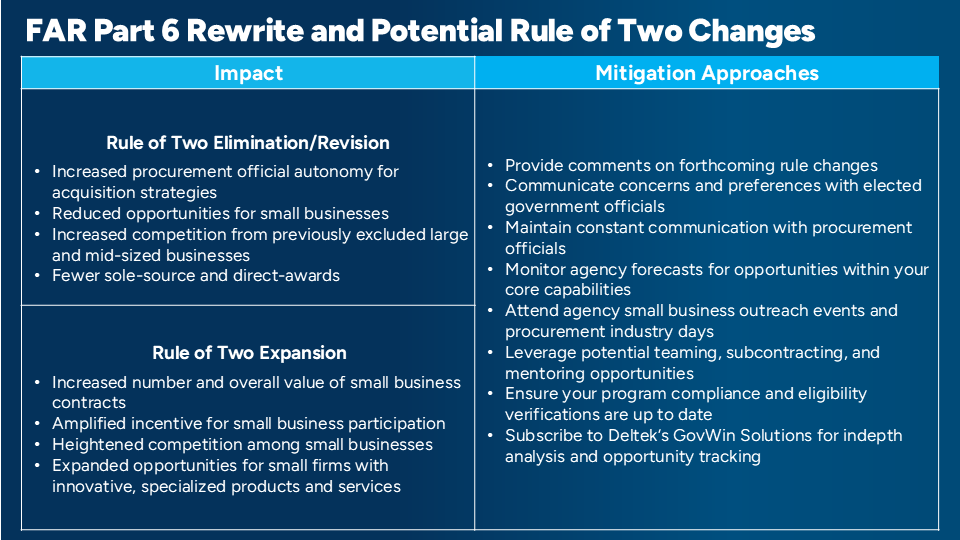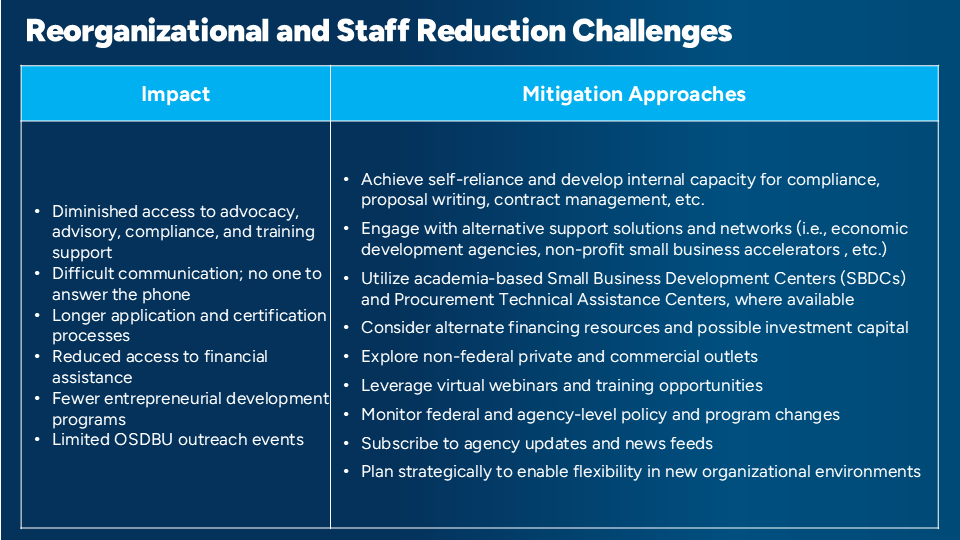Small Business Implications Under the Revolutionary FAR Overhaul, SBA and Program Changes – Part II
Published: August 06, 2025
Federal Market AnalysisAcquisition ReformSmall Business
Ongoing regulatory changes, workforce restructuring and shifts in small business program priorities are compounding the challenges faced by small businesses in FY 2026.
Last week, I examined the potential small business impacts of the General Services Administration’s (GSA) proposed legislative amendments associated with the Revolutionary FAR Overhaul (RFO. This week, I address challenges driven by the FAR Part 6 revision, the 8(a) program audit and ongoing workforce reshaping within the Small Business Administration (SBA) and other agency small business offices.
FAR Part 6 Rewrite Potential Informs Future of the Rule of Two
The Federal Acquisition Regulation (FAR) Part 6 update is part of the ongoing FAR Overhaul (RFO) to keep “only provisions that are required by statute or that are otherwise necessary to support simplicity and usability, strengthen the efficacy of the procurement system, or protect economic or national security interests."
Effective June 27, Part 6 revision streamlines regulation through content organization and references guidance small business programs instead of specific statutory mandates with the intent to eliminating “most” rules that do not comply with EO 14275 14275 Restoring Common Sense to Federal Procurement. The RFO does, however, allow retention of some non-regulatory rules and buying guides that could provide “common sense thought” but still not be included in the FAR, such as the Rule of Two. But, those will have four-year expirations from the effective date and subject to FAR Council renewal.
Instead of listing individual guidance for socio-economic programs as in the original Part 6, the revision simply points agencies to FAR Part 19, which will also be revised. The Council also changed verbiage, making some small business set-asides an option instead of a directive. The revised regulation neither identifies nor codifies the “Rule of Two” in FAR Part 19 – Small Business Programs, Section 19.502 or in SBA regulations 13 C.F.R. Part 125.1.
The Rule is statutorily required (FAR 19), “when certain small contracts that are valued below the Simplified Acquisition Threshold (SAT).” However, it is only an SBA regulation for contracts above the SAT. It is this regulation that is at risk for removal or change within the upcoming FAR 19 rewrite.
In October 2024, the SBA proposed expanding the Rule of Two to multiple-award contract task and delivery orders and “make other regulatory revisions to encourage the use of small businesses when creating new multiple-award contracts.” The SBA purported that expanding the Rule could add up to $6B per year in contract awards to small Businesses. Although comments were collected in December 2024, the rule remains under consideration and has not been officially adopted.
Additionally, Representative Nydia Velasquez introduced H.R. 2804 – The Protecting Small Business Competitions Act of 2025 in April to preserve the Rule, but it has not advanced beyond the introduction level. These potential impacts inform two possible scenarios, elimination and revision or expansion addressed below.

8 (a) Program Audit
On July 29, SBA Administrator Kelly Loeffler issued a warning letter to federal 8(a) program contracting officers requiring them to report potential misconduct, including company officials or “entities that knowingly submit false information, conceal disqualifying facts, or other abuse.” This follows Administrator Loeffler’s order for a complete audit of the program going back 15 years following a DOGE review and Department of Justice (DoJ) investigation exposing $550M bribery scheme involving 8(a) awards from the U.S. Agency for International Development.
Led by the SBA Office of General Contracting and Business Development, the audit involves all 8(a) awards over the past 15 years and includes 8(a) participants who have since graduated from the program and their past contracts. The process began with high-dollar, limited-competition contracts and includes sole source and partially competed contracts, those awarded under joint ventures and mentor-protégé agreements with completion expected by December 31. Items under review include eligibility applications, annual review documentation, contract files, joint-venture and teaming agreements and subcontracts. Results submitted to the SBA Office of Inspector General and DoJ will prescribe enforcement and restitution actions. The audit highlights key challenges and strategic opportunities for both current and former 8(a) contractors, as shown in the figure below.
 Audit Implications and Risk Reduction Activities.png)
SBA and Small Business Office Changes
Ongoing federal workforce reshaping within the SBA and agency small business offices also creates new dynamics that small firms must navigate." SBA announced in March, plans to eliminate 2,700 positions which includes loan processing specialists, outreach coordinators and diversity program managers. Similar downsizing within other agencies such as the Department of Health and Human Services (HHS), left Offices of Small Disadvantaged Business Utilization (OSDBU) short-staffed. While complete data is not available on the total number of terminated small business-related employees or those who voluntarily resigned, sources indicate reductions in the Departments of Energy, Interior, Commerce and the Environmental Agency could include small business and OSDBU offices. Outcomes could change pending decisions on current litigations and legislative actions such as the Save Our Staff (SOS) Act. But for now, it remains a “wait and see” situation. The figure below provides potential impacts and approaches to reduce contractor risks.

Conclusions:
As the RFO and federal workforce reshaping continue, communication remains critical especially for small. Implementing proactive approaches and forward thinking will position these firms for a higher probability for success. And while the current landscape makes this a bit more challenging, it is not impossible. For additional information see my article Navigating New SBA and DFARS Rules Impacting Small Business Contracting in 2025.
Deltek’s Federal Market Analysis Team and GovWin IQ Solution adds a unique toolset to position firms for continued success through budget analysis, strategic outlooks, opportunity tracking and teaming profiles and contract management resources. If you aren’t a Deltek client, schedule your demo today.